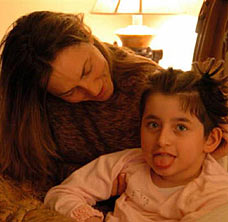
Ashley is a 9 year old who lives in the Western United States (picture from a Daily Mail article). Her case has sparked a huge medical ethics debate having to do with rare medical conditions and parent's medical decision making ability for a child.
Ashley was born with a rare condition of the brain called static encephalopathy. What does this mean? The best way I've seen it described is a type of permanent brain damage. This type of condition is associated with a lot of disabilities like mental retardation, cerebral palsy, autism, and other similar conditions. It's been reported that she currently has the mental capacity of a three month old baby.
Ashley's parents, like other parents, were concerned about how they would care for a special needs child like this. But, unlike other parents, they took an unprecedented step to ask her Seattle doctors to perform what was described as "growth-attenuated" treatment.
Essentially, this type of treatment, prevents physical growth and keeps Ashley in her physical child-like state. Her parents made the argument that Ashley could be more easily cared for in this state. Ashley could be moved easily from place to place and she'll have a better opportunity to interact with other family members.
Who approved this radical treatment? Well, this was reviewed and approved by the hospital ethics committee before the treatments were done - including hysterectomy, removal of breast buds, and high does of estrogen to stunt her growth.
I just read an interesting article by Arthur Caplan, PhD, who is the director of the Center for Bioethics at the University of Pennsylvania:
I believe it is true that it is easier to move Ashley about if she is the size of a 6-year-old. But I also believe that a decent society should be able to provide appropriately sized wheelchairs and bathtubs and home-health assistance to families like this one. Keeping Ashley small is a pharmacological solution for a social failure — the fact that American society does not do what it should to help severely disabled children and their families.Ashley's parents have a blog called The Ashley Treatment. I encourage you to check it out. As of this writing there are 568 comments, and the site states that they have had more than 400,000 hits in 24 hours:
We hope that by now it is clear that the “Ashley Treatment” is about improving Ashley’s quality of life and not about convenience to her caregivers. Ashley’s biggest challenge is discomfort and boredom and the “Ashley Treatment” goes straight to the heart of this challenge. It is common for Ashley to be uncomfortable or to be bored.I admit that my experience with this story is only the last hour since I've been reading up on this case. Plus, what you hear in the press never paints the entire picture. Who really knows what this family is going through?Even though Ashley’s level of tolerance has increased along the years, she is helpless when bothered and her only recourse is to cry until someone comes to her rescue. These episodes are triggered by something as simple as sliding off the pillow or a hair landing on her face and tickling/bothering her, let alone menstrual cramps, adult-level bed sores, and discomfort caused by large breasts. Also, without the treatment, Ashley could not be moved as frequently or be as included in family life, and we would not experience the joy of being an intact family as often.
But, I do know that a case like this could set a dangerous precedent. The first groundbreaking case usually is the most straight forward - and even that is debatable in this case. Now, people, particularly the legal system (sorry counselor curmudgeon), will start finding the grey areas.
Even though the parents deny it, the case will be built that Ashley was treated in this manner as a matter of convenience for the caregiver. So, the next child who is deemed to have "brain damage" and will be difficult to care for will now be eligible for The Ashley Treatment. Think I'm crazy? Possibly. But, mark my words, this story is just starting and will play itself out throughout 2007.
Ethics always lags behind science. When that happens, the legal system and possibly even the government get involved. And, that's where things get ugly. Things get more political. The activists with political agendas get energized. I won't be surprised if this very issue is inserted into the 2008 US Presidental campaign - Remember Terri Schiavo and the end of life debate? Remember Michael J. Fox and the stem cell debate?
I'd better stop before I really get going on a politics/government rant. I mean, this is a medical blog, ya know. Sheesh! Have a nice weekend!
Update 5/9/07: The hospital admitted that it should have obtained a court order before proceeding with the surgery. Read the update here.